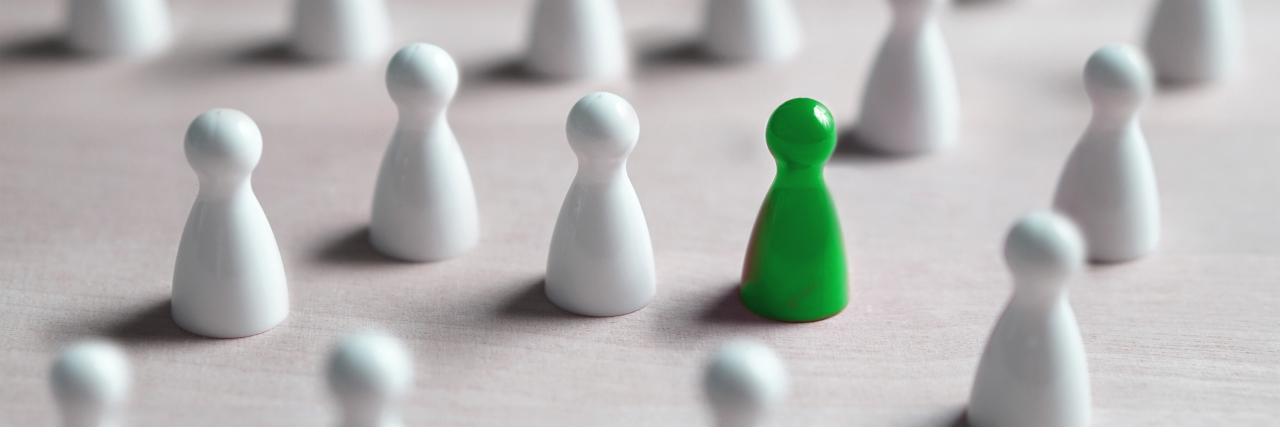It was the first week of third grade. I was freshly 8 years old, high off a blissful summer, and above all else hopeful that this would be the year I would finally feel typical. Normal. Inconspicuous. The way I presumed my able-bodied classmates felt every day of their tweenage lives.
For my third grade self, typicality (along with my far-fetched dream of being an astronaut) was a lofty goal, but despite my painful self-awareness that I was “different,” I was determined to blend in. I may have been the only mainstreamed girl in my grade with mild cerebral palsy and a colorful, medical-chic leg brace to boot, but I refused to let my disability define me.
Unfortunately, through no fault of my own, my ability to blend in with my classmates didn’t exactly last long.
On the fourth day of school, I strolled into the classroom with a breezy smile on my face, expecting another day of multiplication tables and morning sing-a-longs to American classics. I had completely forgotten that it was adaptive PE day; my nightmare come to life.
Adaptive PE was a dubiously coveted honor he school bestowed upon students with disabilities and their classmates. For my able-bodied peers, it was the perfect excuse to gleefully toss foam balls across the room and ride around on those colorful scooter boards that were the epitome of early-2000’s playground fun. For me, adaptive PE was a stark reminder that no matter how hard I tried to wish away my cerebral palsy, it would stay with me for life. Even as I tried my hardest to let loose and have fun with my classmates, adaptive PE days constantly filled me with dread.
That first Thursday of the school year, as soon as I entered the classroom and spotted the whiteboard, my jaw dropped, my heart sank, and my eyes brimmed over with tears. In the top-right corner of the board, in pale pink cursive, my teacher had proclaimed, “9:00 a.m.: Adaptive PE – Thank you, Kelly!”
I didn’t want to think about adaptive PE or cerebral palsy or my name up on the board, inextricably tied to disability. All I wanted was to cry, hide, run away and never come back. I could feel my classmates’ eyes on me as I sobbed, could see their puzzled faces as they wondered why I was so upset. I could hear nothing but the echos of my teacher reassuring me that her words were a compliment, a heartfelt “thank you” for giving us all the opportunity to participate in some eagerly-awaited fun.
No one seemed to understand why their well-intentioned words couldn’t soothe me. No one seemed to care that I had been robbed of my ability to blend in. No one seemed to recognize that my teacher had non-consensually outed me as disabled in front of the entire class.
Naturally, I couldn’t name or express any of my thoughts. I was just a little girl with big feelings, losing control and causing a scene, looking less and less typical by the minute, even as I hoped to finally be “normal.”
Eventually, I calmed down and sullenly stomped off to adaptive PE with my class, where everyone else obliviously had the time of their lives, and my teacher probably wondered how I ended up with such an “attitude problem.” I decided right then and there that I would keep trying to blend in, no matter what. I wished more than anything that I could just leave my disability in the dust, not be outed, not be questioned, just be.
Nearly four years after that ill-fated day of adaptive PE, I had reached a point at which I could finally hide my cerebral palsy. For the next nine years, until I began writing about my life with cerebral palsy, I lived in constant fear that someone would discover my secret, publicly announce my disability, or humiliate me in front of my peers. Even as that third grade adaptive PE class faded further and further into the fabric of my life, it never strayed far from my mind.
Fifteen years after my teacher singled out my disability in front of my entire class, I am still struggling to cope with the lasting emotional effects of that painful day. I now recognize that the hurt and invalidation I felt were valid, that I had every right to cry, but even so, the feelings I experienced will never leave me. I always strive to speak out about my disability before anyone else can, but I am reluctant to open up about my cerebral palsy, out of fear that it will consume my identity. I still vividly recall the pain of the past, but in processing my feelings about being singled out as “disabled,” I am slowly healing, bit by bit.
Getty image by Tero Vesalainen.

